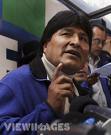Wikileaks Cables on Bolivia: US embassy admits ‘economic roots of social revolution’

Neoliberal policies “which have fed the growing political disaffection of Bolivia’s majority poor, have helped fuel the country’s rolling ‘social revolution.'”
This was how a May 6, 2006, US embassy cable from La Paz recently released by WikiLeaks viewed the powerful wave of struggle that led to the election of Bolivia’s first indigenous president, Evo Morales, in 2005.
This secret assessment came despite Washington publicly trumpeting neoliberal policies as the way to solve the problems of Latin America’s poor.
In 1985, under the advise of US economist Jeffrey Sachs, the Victor Paz Estenssoro government opened up Bolivia’s economy to foreign transnationals.
A number of state-owned companies were privatised, including the crucial mining sector. Restrictions on foreign capital were removed and labour security undermined.
The US embassy admitted in its cable: “Notwithstanding the promises of politicians … poverty was largely impervious to the liberal reforms of the late 80s and 90s.”
It noted the percentage of Bolivians living below the poverty line remained “virtually unchanged (over 60%) … and even increased during the economic crisis of 1999-2003”.
At the same time, neoliberal reforms “clearly failed to meet public expectations for increased incomes and jobs”.
“In fact, reforms had a palpably negative effect on jobs in the short term, immediately causing a 17 percent drop in public sector employment and triggering the dismissal of thousands of public sector miners when resource draining state-owned mining enterprises were shut down.”
In the countryside, neoliberalism’s impact was even more with $966 in urban areas, the cable noted.
“According to INE,” the cable said, “90 percent of the population in urban areas have electricity, while only 29 percent do in rural areas”.
This led to mass migration, in which “between 1999 and 2003 over half a million people or 10 percent of the current urban population migrated to cities”.
One key destination was El Alto, previously an outlying suburb of La Paz. It mushroomed into one of the country’s largest cities.
The cable said the “heightened expectations of newly arrived urban dwellers” in El Alto were critical to promoting an “increased sense of relative deprivation due to the wealth they see around them”.
“So while ‘better off’ in an absolute sense than they were before, they increasingly view access to such services as water, gas, and electricity as a right that the political and social system owes them a right they are willing to take to the streets to demand.”
This helped transform El Alto into what the US cable described as “a central, volatile element in the successive crises” that forced the resignation of two presidents.
The US embassy cable noted that race was another critical dimension to social and economic inequality.
It said: “Most of Bolivia’s majority poor, for example, are of mixed or indigenous origin. Many of the country’s wealthiest families, by contrast, are of conspicuously European descent.
“These apparently race-based social and economic differences have exacerbated the sense of racial separation, and amount, in the view of some critics, to a kind of de facto economic apartheid.”
“Moreover,”, it said, “growing ethnic consciousness has fed increasing ‘indigenous’ resentment of the dominant ‘white’ minority and the political system that allegedly sustained it.”
Nonetheless, the US cable maintained that neoliberalism provided Bolivia with “macro-economic stability and a platform for increased private investment.”
The problem, according to the cable, was the widely held “perception that the large amounts of foreign direct investment Bolivia received between 1997 and 2003 as a result of privatization benefited the rich and not the poor”.
The cable, however, conceded: “This perception was not altogether inaccurate.”
The economic impacts of neoliberalism, combined “with the growing political disaffection of Bolivia’s majority and largely indigenous poor into an explosive and still largely unresolved mix”.
Beginning “with the infamous Cochabamba ‘water wars’ of May (April) 2000”, where protesters forced the government to reverse the privatisation of Cochabamba’s water system to US multinational Bechtel, further “massive protests … led to the ousting of President Gonzalo (‘Goni’) Sanchez de Lozada” in October 2003.
Goni’s replacement, Carlos Mesa, was also forced to resign in June 2005.
A key issue on both uprisings was the “government’s management of Bolivia’s vast natural gas resources”.
These movements were firmly rooted among the poor, indigenous peoples of the west.
The cable noted these regions also voted overwhelming to bring Morales into power on a campaign platform to “nationalize Bolivia’s gas industry, ‘refound’ the state in a Constituent Assembly, and transform the supposedly failed ‘neo-liberal’ economic order for the benefit of Bolivia’s forgotten majority”.
Bolivia’s “ongoing social revolution” continues to move ahead with this program. It has recuperated state control over gas, approved a new constitution and begun to move away from US-backed neoliberal policies.

